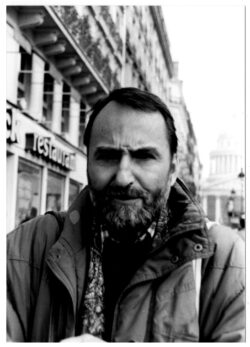“Marin Tarangul” Archive
Archive FundsArchive Funds
“Marin Tarangul” Archive
The catalog of the Marin Tarangul Archive is available here.

Photo: NEC Archive
Marin Tarangul (1938–2010) was a labyrinthic and marginal figure in the Romanian intellectual space. He first studied theology in Sibiu and Bucharest. Between 1961 and 1964, he was a political prisoner, with the indictment comprising charges stemming from organising tea dances set to American music. After his release, he enrolled in the Institute of Fine Arts, jokingly justifying his choice with, “That Faculty is across the street from my house”. He published poetry, essays, and stories in books and cultural magazines of the time.
In 1979, he received a scholarship from the Catholic Institute in Paris and emigrated to France. There, he defended two doctoral theses: one at Sorbonne-Paris IV/Catholic Institute of Paris on the experience of the icon (1985) and another at the Institute of Eastern Studies on Nichita Stănescu’s poetry (1987). He lived frugally, relying on various grants or occasional jobs, but he wrote prolifically and maintained an astonishing publishing activity, as he had done in Romania during the 1960s and 1970s.
From 1995 onwards, he returned to Romania every year, reconnecting with old friends from his youth, such as Andrei Pleșu. He continued to publish essays on Philosophy, Art History, Literary Criticism, and Theology, with volumes published by the Humanitas Publishing House and contributions to the leading cultural journals of the time. Despite the above, he failed to keep a permanent job and consistently eluded a well-defined intellectual profile: he was more interested in finding answers to a series of questions than focusing on a specific academic field.
As an avid reader interested in various fields, he practised a form of writing akin to an alchemy of thought, constantly seeking the fertile border between the known and the unknown.
In 2010, he died suddenly, a month before the publication of Nocturnal.
Marin Tarangul’s work covers a wide range of fields: Art, Philosophy, Theology, Literature, Literary Criticism, etc.
The same variety is reflected both by the significant donation of more than ten thousand books and the archive comprising around 2,300 items. The documents are organised into categories such as various texts, notes and articles, correspondence, photos, personal items, etc. Currently, a digitisation process is underway. Over 30% of the documents in electronic format are already available upon request. At the same time, the Junimea Publishing House in Iași is preparing an author series featuring all his texts.
— Prof. Ioan Alexandru Tofan, Departamentul de Filosofie, Universitatea „Alexandru Ioan Cuza” din Iași